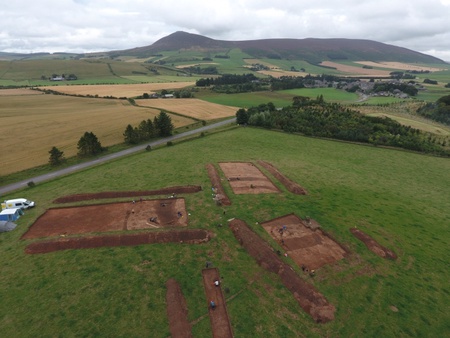The nature of the societies that filled the chasm left by the demise of the Roman Empire in the 5th century AD remains one of the relative unknowns of history.
While there has been focus on the ways in which famous kingdoms such as those of Anglo-Saxon England or Frankia emerged, there has been little study of how the societies that lived beyond the limits of the Roman world were similarly transformed in this period.
Now researchers from the University of Aberdeen have been awarded almost £1million to investigate Europe’s ‘lost kingdoms’ and seats of power in Scotland, Ireland and Northern Ireland.
The five-year project, funded by the Leverhulme Trust, will be led by archaeologist Dr Gordon Noble, from the School of Geosciences at the University of Aberdeen. He says while the names Burghead, Cashel and Dunseverick may not resonate in the same way as the late and post-Roman seats of power of Mainland Europe, they have for centuries been overlooked in their historical importance.
“In contrast to the study of the Roman Empire and its successors, first-millennium AD northern Europe has not been studied to the same level and rarely within an international context,” Dr Noble said.
“It is generally considered that in northern Britain and Ireland, the Roman presence had only been fleetingly felt and that these societies were less developed than those of the successor states of the Roman Empire, with a comparatively flat social and economic hierarchy and lacking in developed structures of power and governance.
“But increasingly, the archaeological and historical evidence can tell a different story of complex, highly stratified societies with developed strategies of rulership and governance and sophisticated seats of power.”
Dr Noble and his team from the University of Aberdeen have already carried out excavations in Scotland at sites such as Rhynie in Aberdeenshire and found substantial evidence which points to it being a sophisticated Pictish power centre of international significance, which enjoyed long-distance trade contacts with Anglo-Saxon England, Frankia and the Byzantine world.
“Our work at Rhynie shows how even modest programmes of archaeological investigation can illuminate the seats of power of these early kingdoms.
“This grant will allow us to conduct more extensive field investigations of sites like Rhynie and to compare them to other early medieval seats of power in Scotland, Republic of Ireland and Northern Ireland.”
Dr Noble says the award from the Leverhulme Trust will open up new opportunities to investigate how the post-Roman Kingdoms of Ireland and Scotland operated at a national and international level and how they compared in scale and character with those known elsewhere in Europe. They will study in detail sites such as Burghead, in Moray, Scotland, Cashel in County Tipperary, Republic of Ireland and Dunseverick near the Giant's Causeway in County Antrim, Northern Ireland – all nationally important sites in their own respect.
“In contrast to the study of the Roman Empire and its successors, first-millennium AD northern Europe is almost exclusively studied at a local and regional level,” he added.
“There has been very little detailed inter-and intra-regional research, despite an upsurge in archaeological data.
“We will be able to investigate in details the differences and similarities between Pictland in northern Scotland, Dál Riata - a Gaelic-speaking polity spanning County Antrim in Northern Ireland and Argyll and the Inner Hebrides of Scotland, and Gaelic kingdoms in Munster, Ireland.
“We will bring together experts in archaeology, history, placename studies and paleoecology to build a much fuller picture of these kingdoms. The project involves scholars from a range of fields which should give us an unprecedented opportunity to understand how these early kingdoms were created, developed and were ultimately transformed.
“The areas outside the bounds of the Roman Empire have for too long played relatively minor and peripheral roles in the ‘grand narratives’ of European history.
“We hope that this grant will enable us to begin to challenge that and to present a very different view of how society changed in the post-Roman period in these kingdoms at the ‘periphery’ of Europe.”
The Leverhulme Research Leadership Award will enable the project to run over a five year period and is worth a total of £971,149. It is the first time the University of Aberdeen has received the award, which supports talented academics to further their research.
Professor Ian Diamond, Principal and Vice-Chancellor of the University of Aberdeen said: “An archaeology programme at the University of Aberdeen was only established in 2007 and since then the discipline has gone from strength to strength.
“The department specialises in the ‘archaeology of the North’, a focus which is unique to Aberdeen, and we are delighted that Dr Noble and his team will be able to conduct cutting-edge research which will significantly enhance our understanding of the early societies of Northern Europe.”


